|
|
|
Sort Order |
|
|
|
Items / Page
|
|
|
|
|
|
|
| Srl | Item |
| 1 |
ID:
103910
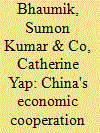

|
|
|
|
|
| Publication |
2011.
|
| Summary/Abstract |
Chinese firms undertake large scale contracted projects in a number of countries under the auspices of economic cooperation. While there are suggestions that these activities are an extension of China's soft power aimed at facilitating Chinese foreign direct investment (FDI) in those countries, often for access to natural resources, there is no systematic analysis of this in the literature. In this paper, we examine China's economic cooperation related investment (ECI) over time. Our results suggest that the pattern of investment is indeed explained well by factors that are used in the stylised literature to explain directional patterns of outward FDI. They also demonstrate that the (positive) relationship between Chinese ECI and the recipient countries' natural resource richness is not economically meaningful. Finally, while there is some support for the popular wisdom that China is willing to do business with countries with weak political rights, the evidence suggests that, ceteris paribus, its ECI is more likely to flow to countries with low corruption levels and, by extension, better institutions.
|
|
|
|
|
|
|
|
|
|
|
|
|
|
|
|
| 2 |
ID:
182760
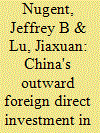

|
|
|
|
|
| Summary/Abstract |
Because of the potentially large and important effects of the extremely ambitious Belt and Road Initiative (BRI) launched by China in late 2013, considerable attention has been given to the motives for, and repercussions of, the BRI-driven infrastructural projects. Yet, the non-infrastructural outward foreign direct investment (FDI) from China to BRI countries, which varies quite substantially across different sectors and different countries, has not yet received much attention. In contrast to some recent studies showing that the massive initiative has increased China's total FDI outflows to fellow BRI countries, in this paper, based on our sector-level difference-in-differences models, we find that effect to be statistically insignificant. Yet, at the same time, we provide empirical evidence on the sectoral pattern of China's outward FDI before and after 2014 indicating that China's FDI outflows to BRI countries have significantly increased in sectors characterized by overcapacity and contributing to pollution in China, thereby demonstrating that China's BRI-driven outward FDI has been very selective in terms of sectors. We confirm these findings with a variety of robustness checks and show that it is BRI countries with relatively low institutional quality that have been more likely to receive these types of FDI from China. We thus speculate that Chinese firms have been motivated to place FDI investments in BRI countries for the sake of alleviating China's own overcapacity and pollution problems. Our findings lead us to suggest that, although these sectoral patterns are consistent with the different stages of economic development in which China and its fellow BRI-identified countries find themselves, Chinese investors and host country governments should be more concerned with the potential for unwanted side-effects of the FDI investments so that the mutually beneficial effects of the BRI can be sustained into the indefinite future among all countries involved.
|
|
|
|
|
|
|
|
|
|
|
|
|
|
|
|
| 3 |
ID:
157062
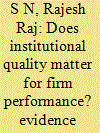

|
|
|
|
|
| Summary/Abstract |
How does institutional quality affect firm performance? We examine the effect of various measures of institutions on firm productivity, using a rich micro level data on manufacturing enterprises in India drawn from the Enterprise Surveys of the World Bank. Our results suggest that bureaucratic corruption negatively influences firm productivity. In contrast, other institutional variables seem to have less influence on firm performance. This suggests that the focus of the Indian government needs to be redirected to address the corrupt practices at various levels rather than focusing just on improving the measures of doing business.
|
|
|
|
|
|
|
|
|
|
|
|
|
|
|
|
| 4 |
ID:
132519


|
|
|
|
|
| Publication |
2014.
|
| Summary/Abstract |
This study investigates the role of the institutions as a determinant of foreign direct investment (FDI) in the case of Pakistan by applying the autoregressive distributed lag (ARDL) cointegration technique. The results demonstrate that the institutional quality exerts long-run impact in determining the FDI inflows. The findings suggest that institutional quality is an important determinant of the FDI in Pakistan. The joint impact of institutional quality and trade openness is also significant and positively contribute to attract FDI in the short run as well as in the long run. The findings strongly support the hypothesis that simultaneous implementation of policy mix, that is, reducing trade barriers and improvement in institutional quality, play significant role in attracting FDI in a developing country like Pakistan.
|
|
|
|
|
|
|
|
|
|
|
|
|
|
|
|
| 5 |
ID:
168358


|
|
|
|
|
| Summary/Abstract |
The proposed income distribution effect of financial liberalization has gradually attracted the attention of academic economists, but the research results are inconsistent and even contradictory. This paper presents a quantitative review of these studies. The objectives are to assess the impact of financial liberalization on income inequality and to identify the sources of heterogeneity. A meta-analysis is performed with 23 empirical cross-country studies on the relationship between financial liberalization and income inequality, yielding a total of 556 estimates. We find overall support for the small negative relationship between financial liberalization and income inequality when considering potential publication bias and method heterogeneity. Our results suggest that different impact channels, institutional quality, the measurement used for financial liberalization and income inequality, and the use of different econometric methods are especially effective for explaining the differences in past study findings.
|
|
|
|
|
|
|
|
|
|
|
|
|
|
|
|
| 6 |
ID:
167570


|
|
|
|
|
| Summary/Abstract |
This article seeks to deepen our understanding of the globalisation–growth nexus as it extends the investigation to using a spatial econometric approach, hitherto rarely used in the globalisation literature. The objective of the article is to uncover not only the significant growth effects of globalisation but also its possible spillover effects onto neighbouring countries. Using a panel data set of 83 countries across a 30-year period and via a spatial autoregressive panel data method, this article estimates a standard growth model augmented with a parameter to capture the countries’ spatial dependence, whilst controlling for globalisation indices. The findings indicate a positive effect of economic globalisation, which is dependent upon the political settings in the countries under study. The spillover effects of globalisation across neighbouring countries are shown, both in geographical and institutional spheres. The article concludes with some policy recommendations.
|
|
|
|
|
|
|
|
|
|
|
|
|
|
|
|
| 7 |
ID:
133185
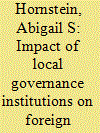

|
|
|
|
|
| Publication |
2014.
|
| Summary/Abstract |
This paper exploits the substantial variation in market institutions across provinces in China to examine the impact of institutional quality on foreign listing. Firms that are listed on the U.S. and U.K. exchanges are more likely to come from better regulated provinces and tend to be at the top of a corporate pyramid. However, though the impact on firm performance of market institutions and pyramidal affiliations persists briefly post-listing with firms recording lower EPS and higher raw returns in the first year, it does not help predict whether firms remain listed abroad in 2012. Thus, we conclude that headquarters' market institutions shape a firm through time of listing and have diminished influence over time.
|
|
|
|
|
|
|
|
|
|
|
|
|
|
|
|
| 8 |
ID:
169866
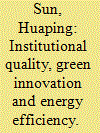

|
|
|
|
|
| Summary/Abstract |
This paper examines the energy efficiency performance of a sample of 71 developed and developing countries between 1990 and 2014. In most current energy literature, the transition to green technology is seen as a sustainable way to achieve a low-carbon or carbon-free environment. Bearing this in mind, we argue further that adopting green technology needs a strong backing and funding of reliable government institutions to shift the country's paradigm. Considering this issue, we adopt the parametric stochastic frontier approach built on the shepherd distance function to evaluate the effects of both governmental institutions and green technologies on energy efficiency. We find evidence of a significant positive influence of both green innovation and institutional quality on energy efficiency enhancement having controlled for some variables. Regarding energy efficiency levels of the individual countries- USA, Japan, Germany and Australia lead the chart while Belize, Panama, Singapore, Malta, Sierra Leone, Iceland, Jamaica, Bahrain and Ghana are the least energy efficient countries. Policy implications are further discussed.
|
|
|
|
|
|
|
|
|
|
|
|
|
|
|
|
| 9 |
ID:
168868
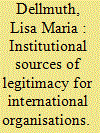

|
|
|
|
|
| Summary/Abstract |
This article addresses a significant gap in the literature on legitimacy in global governance, exploring whether, in what ways, and to what extent institutional qualities of international organisations (IOs) matter for popular legitimacy beliefs towards these bodies. The study assesses the causal significance of procedure and performance as sources of legitimacy, unpacks these dimensions into specific institutional qualities, and offers a comparative analysis across IOs in three issue areas of global governance. Theoretically, the article disaggregates institutional sources of legitimacy to consider democratic, technocratic, and fair qualities of procedure and performance. Empirically, it examines the effects of these institutional qualities through a population-based survey experiment in four countries in different world regions with respect to IOs in economic, security, and climate governance. The findings demonstrate that both procedure- and performance-related aspects of IO policymaking matter for popular legitimacy beliefs. This result holds across democratic, technocratic, and fair qualities of IO procedure and performance. Disaggregating the results by issue area indicates that a broader scope of institutional qualities are important for legitimacy beliefs in economic governance compared to security governance and, especially, climate governance. These findings suggest that propositions to reduce the institutional sources of IO legitimacy to single specific qualities would be misguided.
|
|
|
|
|
|
|
|
|
|
|
|
|
|
|
|
| 10 |
ID:
133269


|
|
|
|
|
| Publication |
2014.
|
| Summary/Abstract |
This study adds to the understanding of China's innovation prospects by examining how variations in institutional quality within China impact on the R&D efforts of firms located in different provincial regions. In the process of identifying the effect of institutional quality, the roles of other factors such as ownership types and market structures are revealed, which provides interesting insight into firms' R&D behavior. The key findings suggest that institutional quality positively affects the decision of firms to engage in R&D activities. Once firms start to engage in R&D, the subsequent expansion of firm-level R&D intensity depends on factors such as market structure. Therefore, strengthening domestic institutional quality is the first critical step towards the goal of building a knowledge-intensive economy in China. Efforts to nurture market development are also important for achieving this goal.
|
|
|
|
|
|
|
|
|
|
|
|
|
|
|
|
| 11 |
ID:
099849


|
|
|
|
|
| Publication |
2010.
|
| Summary/Abstract |
As states get stronger, they are expected to be more successful in preventing insurgency and, in turn, the occurrence of civil wars. While intuitively appealing, the theoretical and empirical understanding of the linkage between state capacity and civil war onset remains at an early stage of development. To date, the role of state capacity has been conceptualised and measured in limited ways that focus mainly on the repressive ability of the state. In this paper, we broaden the understanding of state capacity by incorporating an important but neglected dimension; institutional quality. We examine the relationship between institutional quality and civil war onset and argue that states characterised with high institutional quality are less likely to experience civil war. Analysis of cross-national time-series data from 1984 to 1999 reveals that the quality of institutions, defined as freedom from corruption in government, rule of law, and bureaucratic quality, plays a significant role in explaining the likelihood of civil war onset.
|
|
|
|
|
|
|
|
|
|
|
|
|
|
|
|
|
|
|
|
|